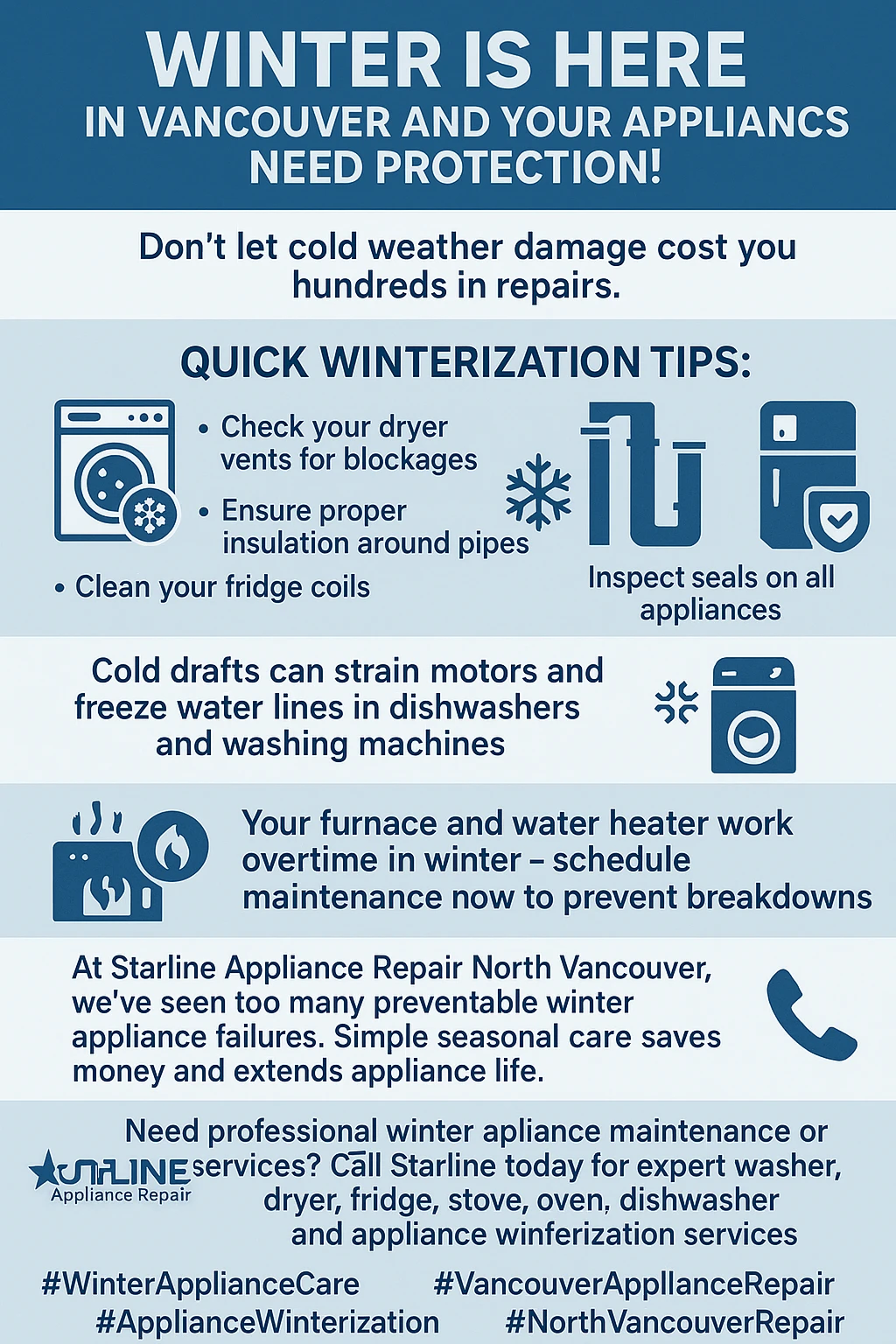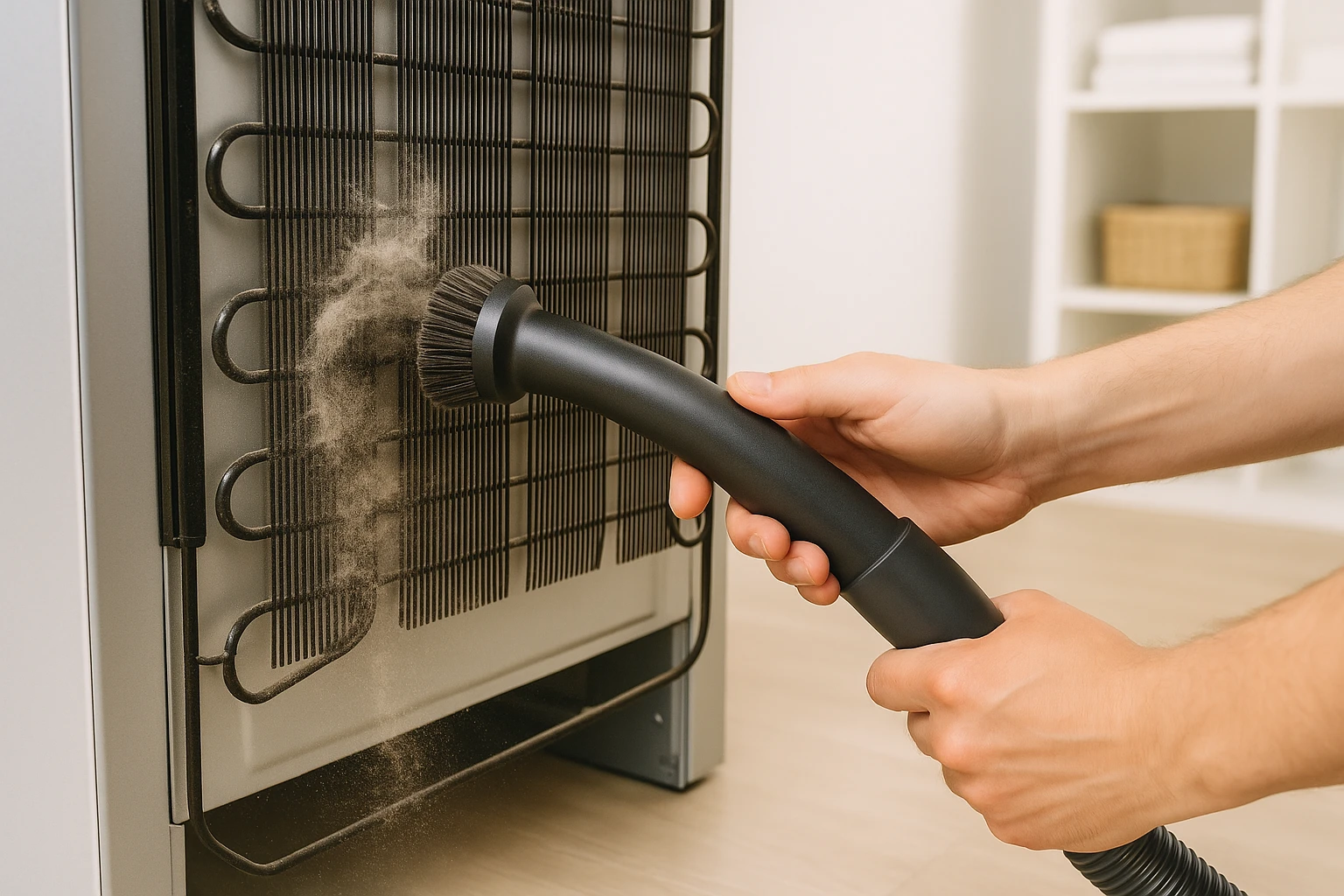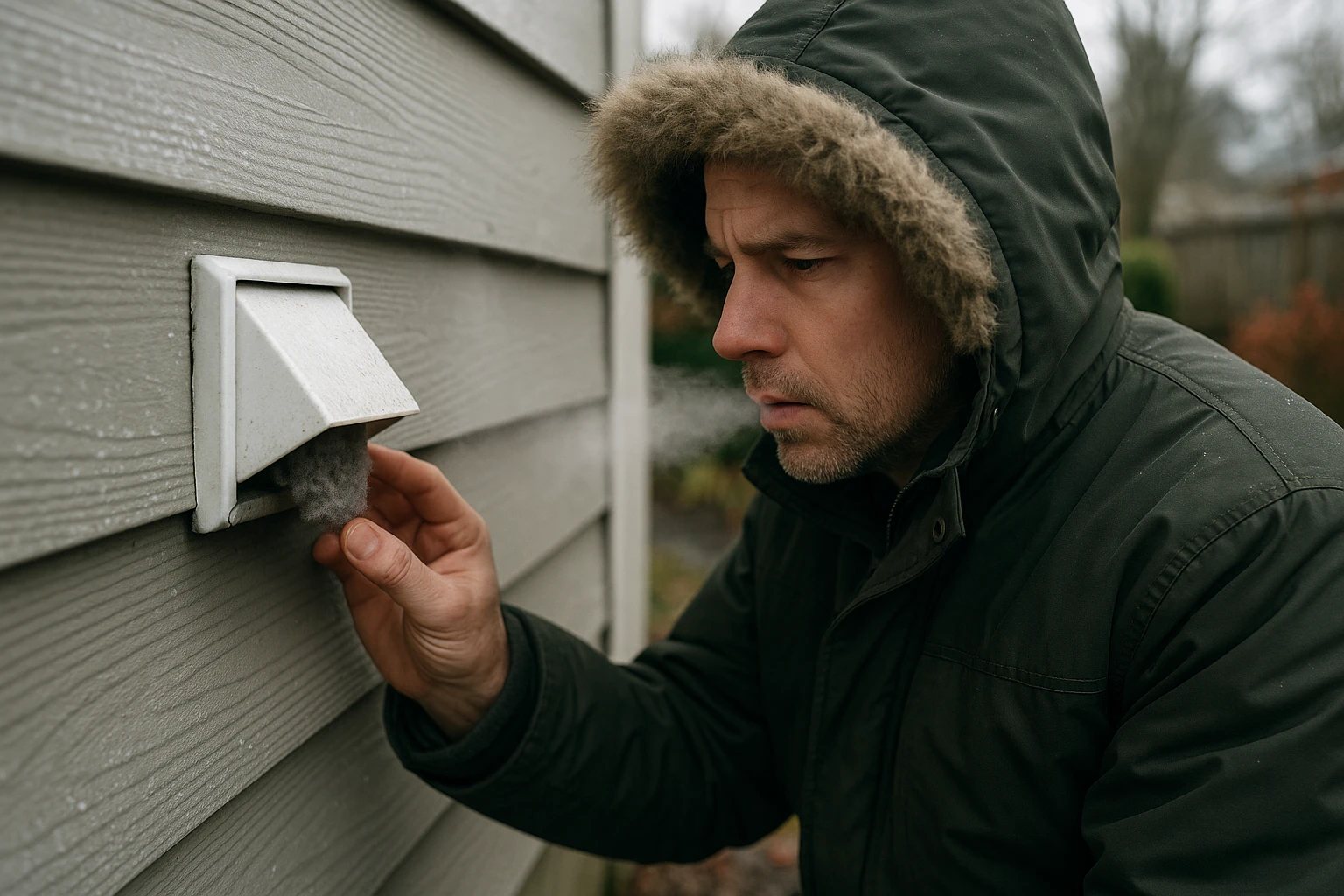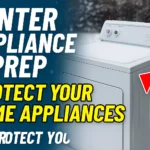Worried about your appliances surviving another brutal Vancouver winter? Our comprehensive guide reveals the essential steps to shield your valuable home equipment from Vancouver’s unique freeze-thaw cycles and prevent costly emergency repairs when you need your appliances most.Vancouver’s notorious wet winters create the perfect storm for appliance breakdowns. Unlike other Canadian cities that stay consistently cold, Vancouver’s constant freeze-thaw cycles wreak havoc on your home’s essential equipment. One day it’s hovering around freezing, the next it’s mild and rainy – this constant temperature fluctuation puts incredible stress on everything from your refrigerator’s compressor to your dryer’s venting system. When you combine this with the increased holiday cooking and laundry loads, it’s no wonder December through February sees the highest spike in appliance repair calls across the Lower Mainland. Smart homeowners know that a little preparation now saves hundreds (or even thousands) of dollars later. The key is understanding how Vancouver’s specific climate challenges affect different appliances and taking targeted action before problems strike. From protecting water lines that can freeze during those sudden cold snaps to ensuring proper ventilation when humidity levels soar, winter appliance prep isn’t just about maintenance – it’s about adapting to our unique West Coast winter conditions.Think of appliance winterization like putting winter tires on your car. You wouldn’t wait for the first snowfall to make the switch, and you shouldn’t wait for your dishwasher to start acting up when cold water hits those internal components. The good news? Most winter prep tasks are surprisingly simple and can be completed in a weekend. By following our proven strategies, you’ll keep your appliances running efficiently all season long while extending their lifespan and maintaining those valuable manufacturer warranties.
Key Outtakes
- Vancouver’s freeze-thaw cycles stress appliance components more than consistent cold temperatures, making targeted winterization essential for preventing breakdowns
- Cold water entering appliances forces motors and heating elements to work harder, significantly increasing energy bills and wear on expensive parts
- Simple preventive measures like cleaning coils, checking seals, and adjusting water heater temperatures can prevent 80% of common winter appliance failures
- Holiday usage spikes combined with winter conditions create the perfect recipe for breakdowns – preparation before December saves emergency repair costs
- Professional maintenance for gas appliances and complex systems ensures safety and efficiency during peak winter usage

Understanding Vancouver’s Unique Winter Appliance Challenges
Vancouver winters present a unique set of challenges that many homeowners don’t fully appreciate until they’re facing a costly repair bill. Unlike the prairie provinces where temperatures stay consistently below freezing, Vancouver’s coastal climate creates constant temperature swings that put tremendous stress on appliance components. This week it might dip to -5°C overnight, then warm up to 8°C by afternoon – a 13-degree swing that makes materials expand and contract repeatedly. Your appliances aren’t designed for this constant thermal stress, and over time, seals crack, connections loosen, and components fail prematurely.

The high humidity that comes with our winter rain creates another layer of complexity. When warm, moist air meets cold appliance surfaces, condensation forms in places it shouldn’t be. This moisture can corrode electrical connections, promote mold growth in washing machines, and cause metal components to rust faster than they would in drier climates. I learned this the hard way when my three-year-old dishwasher developed a mysterious electrical fault – turns out condensation had been building up behind the control panel for months, slowly corroding the circuit board.Cold tap water is perhaps the most overlooked winter challenger for Vancouver homeowners. When your water temperature drops from its summer high of around 18°C to winter lows of 6-8°C, your hot water appliances have to work significantly harder. Your dishwasher’s heating element runs longer cycles, your washing machine struggles to dissolve detergent effectively, and your hot water heater cycles more frequently to maintain target temperatures. This extra workload doesn’t just increase your hydro bill – it accelerates wear on these expensive components and can lead to premature failure during the peak usage holiday season.
Kitchen Appliance Winter Protection Strategies
Your kitchen bears the brunt of winter appliance stress, especially with increased holiday cooking and entertaining. The constant temperature fluctuations affect everything from how your refrigerator maintains consistent cooling to how efficiently your dishwasher cleans dishes with that frigid incoming water. Smart preparation focuses on the most vulnerable components and the appliances that work hardest during Vancouver’s wet, unpredictable winters.Starting with your refrigerator and freezer, these workhorses face unique challenges when ambient temperatures drop and indoor heating systems create dry air. The rubber door seals become brittle in cold weather and can develop tiny cracks that let warm air seep in, forcing your compressor to work overtime. Test your seals monthly during winter by closing the door on a piece of paper – if you can pull it out easily, it’s time for replacement seals. This simple $50 fix can save you hundreds in energy costs and prevent a compressor failure that could cost $800 or more to repair.The condenser coils on the back or bottom of your fridge collect dust faster in winter when heating systems circulate more particles through the air. Dirty coils are like putting a winter coat on your refrigerator – they trap heat and make the compressor work harder. Clean these coils every three months during winter using a vacuum with a brush attachment, and you’ll improve efficiency by up to 25% while preventing overheating damage. Pay special attention if you have pets, as their winter undercoats shed more and can create significant coil blockages.  Your dishwasher faces the double challenge of cold incoming water and increased holiday usage. When water enters at 6°C instead of summer’s 18°C, your dishwasher’s heating element works overtime to reach the 60°C temperature needed for effective cleaning and sanitizing. Run hot water at your kitchen sink until it’s steaming before starting a dishwasher cycle – this pre-warms the supply line and reduces stress on the heating element. Additionally, use dishwasher cleaner monthly during winter to remove mineral buildup that accumulates faster when heating elements work harder.Food preparation appliances like ovens and stovetops see heavy use during the holiday season, and Vancouver’s humidity can affect their performance in unexpected ways. Gas appliances are particularly sensitive to moisture in the air, which can affect combustion efficiency and create uneven heating. Ensure your range hood is working properly to manage both cooking moisture and improve air circulation around gas burners. Electric ovens benefit from having their door seals checked – cold drafts from poorly sealed oven doors affect temperature consistency and force heating elements to cycle more frequently.
Your dishwasher faces the double challenge of cold incoming water and increased holiday usage. When water enters at 6°C instead of summer’s 18°C, your dishwasher’s heating element works overtime to reach the 60°C temperature needed for effective cleaning and sanitizing. Run hot water at your kitchen sink until it’s steaming before starting a dishwasher cycle – this pre-warms the supply line and reduces stress on the heating element. Additionally, use dishwasher cleaner monthly during winter to remove mineral buildup that accumulates faster when heating elements work harder.Food preparation appliances like ovens and stovetops see heavy use during the holiday season, and Vancouver’s humidity can affect their performance in unexpected ways. Gas appliances are particularly sensitive to moisture in the air, which can affect combustion efficiency and create uneven heating. Ensure your range hood is working properly to manage both cooking moisture and improve air circulation around gas burners. Electric ovens benefit from having their door seals checked – cold drafts from poorly sealed oven doors affect temperature consistency and force heating elements to cycle more frequently.
Laundry Room Winterization Essentials
The laundry room often gets overlooked in winter prep discussions, but it’s actually one of the most vulnerable areas in your home. Cold water temperatures, increased humidity from wet winter clothes, and heavier fabric loads create a perfect storm of challenges for your washer and dryer. Vancouver homes face the additional challenge of basement or utility room locations that can get quite cold, affecting how these appliances operate and introducing moisture problems that can lead to serious issues.Your washing machine struggles significantly with cold water temperatures during Vancouver winters. When incoming water drops below 10°C, detergents don’t dissolve properly, fabric softeners can leave residue, and cleaning performance suffers dramatically. Modern high-efficiency washers are particularly affected because they use less water overall, meaning that cold water has less opportunity to warm up during the cycle. Adjust your water heater temperature to 54°C (130°F) during winter months to ensure adequate hot water delivery, but be cautious not to go higher as this creates scalding risks and wastes energy.Winter also means washing heavier items like coats, boots, and muddy outdoor gear tracked in from Vancouver’s wet streets. These items put extra stress on your washer’s motor and suspension system. Distribute heavy items evenly in the drum, and resist the temptation to overload just because you’re washing bulkier pieces. A single heavy coat should be washed with a few lighter items to balance the load – unbalanced loads cause excessive vibration that can damage drum bearings and create expensive repair issues.Your dryer faces winter challenges that many homeowners never consider. Cold exterior air affects venting efficiency, especially if your dryer vent exits on a north-facing wall that doesn’t get winter sun. Check your exterior vent regularly for ice buildup, which can block airflow and cause your dryer to overheat or run inefficiently. Clear any lint buildup from the entire vent system before winter sets in – cold, humid air makes lint more likely to clump and stick to vent walls, creating dangerous fire hazards and reducing drying efficiency.  The lint screen needs more attention during winter months when you’re drying heavier fabrics and items that have been exposed to rain and mud. Clean the screen after every single load, and wash it with warm soapy water weekly to remove fabric softener buildup that reduces airflow. Consider upgrading to a wool dryer ball system instead of fabric softener sheets – they reduce drying times, eliminate chemical residue, and work more effectively with the varied fabric weights you’ll be drying during winter months.Humidity management becomes critical in utility rooms during Vancouver’s wet season. If your laundry area doesn’t have adequate ventilation, moisture from washing and drying creates an environment where mold can grow behind and under appliances. Install a small exhaust fan if you don’t have one, and consider a dehumidifier for basement laundry rooms. This investment protects not just your appliances but your home’s structure and indoor air quality throughout the demanding winter months.
The lint screen needs more attention during winter months when you’re drying heavier fabrics and items that have been exposed to rain and mud. Clean the screen after every single load, and wash it with warm soapy water weekly to remove fabric softener buildup that reduces airflow. Consider upgrading to a wool dryer ball system instead of fabric softener sheets – they reduce drying times, eliminate chemical residue, and work more effectively with the varied fabric weights you’ll be drying during winter months.Humidity management becomes critical in utility rooms during Vancouver’s wet season. If your laundry area doesn’t have adequate ventilation, moisture from washing and drying creates an environment where mold can grow behind and under appliances. Install a small exhaust fan if you don’t have one, and consider a dehumidifier for basement laundry rooms. This investment protects not just your appliances but your home’s structure and indoor air quality throughout the demanding winter months.
Advanced Winter Protection for High-End Appliances
Premium appliances require special attention during Vancouver winters because their sophisticated systems are more sensitive to temperature fluctuations and power variations common during storm season. Built-in refrigeration units, wine coolers, and commercial-grade ranges have precise calibration requirements that can be affected by the electrical grid fluctuations we often see during winter storms. These appliances also represent significant investments that warrant extra protection measures beyond basic maintenance.Wine storage systems and beverage centers are particularly vulnerable to temperature swings because they’re designed to maintain very specific conditions. Vancouver’s freeze-thaw cycles can cause these units to work harder than designed, especially if they’re located in areas like garages or basement spaces that aren’t climate-controlled. Check the ambient temperature range specifications for your wine cooler – most are designed to operate in environments between 13°C and 32°C. If your storage area drops below this range, consider adding supplemental heating or relocating temperature-sensitive beverages to a more stable environment.High-end dishwashers with multiple wash zones and precise water temperature controls face unique challenges when incoming water temperatures drop significantly. These sophisticated systems rely on accurate temperature sensors and precise water heating to deliver optimal cleaning performance. Have the temperature sensors calibrated annually, and consider installing a hot water recirculation system if your kitchen is located far from your water heater. This ensures consistent hot water delivery and prevents the advanced wash systems from having to compensate for cold water slugs that can throw off their carefully programmed cycles.Commercial-grade ranges and cooktops require professional attention before winter peaks because they operate at higher BTU outputs and have more complex safety systems. Gas models need their pilot lights and electronic ignition systems checked for proper operation in cold conditions. Professional technicians can verify proper gas pressures and combustion efficiency that may be affected by barometric pressure changes and humidity fluctuations common during Vancouver’s stormy winter weather. Electric models benefit from having their power connections and internal wiring inspected for any issues that could be exacerbated by the increased usage during holiday cooking marathons.Steam cooking appliances and combi-ovens face particular challenges with Vancouver’s variable water quality during winter months. Increased rainfall can affect mineral content in municipal water supplies, leading to scale buildup in steam generation systems. Use only distilled water in steam appliances during winter months, and perform descaling procedures more frequently – monthly instead of quarterly – to prevent mineral deposits from affecting performance and potentially damaging expensive steam generation components.
Emergency Preparedness and Professional Maintenance
Winter storms can knock out power for hours or even days, and being prepared for these outages protects both your food investment and your appliances from damage when power returns. Power surges during restoration can damage sensitive electronic controls, while sudden power loss can interrupt cycles in ways that stress mechanical components. Smart preparation involves both surge protection and knowing how to safely restart appliances after extended outages.Invest in quality surge protection for all major appliances, but pay special attention to units with electronic controls and digital displays. Whole-house surge protection is ideal, but individual appliance surge protectors work well too. Look for units rated for the specific amperage of your appliances – a standard household surge protector won’t adequately protect a large electric dryer or range. During extended outages, unplug appliances rather than just turning them off, as this provides complete protection from power restoration surges that can slip past some surge protection devices.Create an outage action plan for your refrigeration appliances to minimize food loss and prevent damage from temperature abuse. Keep appliance thermometers in your fridge and freezer so you can monitor temperatures even when digital displays are dark. A full freezer stays cold for 48 hours if unopened, while a half-full unit only maintains safe temperatures for 24 hours. Having this knowledge helps you make informed decisions about when to use backup power or relocate frozen items to friends’ homes or temporary cold storage.Professional maintenance becomes even more critical before Vancouver’s challenging winter months. Gas appliances should be serviced annually by certified technicians who can verify proper combustion, check for gas leaks, and ensure ventilation systems are working correctly. This isn’t just about efficiency – it’s about safety. Carbon monoxide risks increase when gas appliances aren’t burning cleanly, and winter’s tendency to keep homes sealed up tight can allow dangerous gases to accumulate.Schedule maintenance for complex appliances like combination washer-dryers, built-in coffee systems, and multi-zone HVAC units before the holiday season reaches full swing. These systems have multiple interconnected components that can be affected by winter conditions in ways that aren’t immediately obvious. A professional can identify potential issues like worn seals, corroded connections, or calibration drift that could lead to failures during the worst possible times – right when you’re hosting family or preparing holiday meals.Don’t overlook the value of establishing relationships with reliable appliance repair services before you need them. Research companies that offer emergency services and understand the lead times for parts during busy winter months. Keep contact information for qualified repair technicians easily accessible, and ask about priority service programs that can get you faster response during peak breakdown seasons. Some companies offer annual service contracts that include priority scheduling and discounted repairs – an investment that often pays for itself with just one urgent service call avoided.
Frequently Asked Questions
How often should I clean my refrigerator coils during Vancouver winters?
Clean your refrigerator coils every two to three months during winter, more frequently than the typical twice-yearly recommendation. Vancouver’s wet climate and increased use of heating systems circulate more dust and particles through your home, causing coils to accumulate debris faster. Pet owners should check monthly, as winter coat shedding creates additional buildup. Use a vacuum with a brush attachment and work gently to avoid damaging the delicate fins.
Why does my dishwasher seem to clean poorly during winter months?
Cold incoming water is the primary culprit behind poor winter dishwasher performance. When water temperatures drop from summer highs of 18°C to winter lows around 6°C, detergents don’t dissolve effectively and the heating element must work much harder to reach optimal cleaning temperatures. Run hot water at your kitchen sink until steaming before starting the dishwasher, and consider switching to powder detergent which dissolves more readily in varying temperatures than pods or gels.
Should I adjust my water heater temperature for winter appliance performance?
Yes, but carefully. Raising your water heater temperature to 54°C (130°F) during winter helps appliances like dishwashers and washing machines perform optimally with cold incoming water. However, never exceed this temperature due to scalding risks, and consider installing anti-scald devices at fixtures used by children or elderly family members. The improved appliance performance and energy efficiency typically offset the slight increase in water heating costs.
What’s the most important dryer maintenance task for Vancouver winters?
Clearing your entire dryer vent system is crucial before winter sets in. Vancouver’s humid winter air causes lint to clump and stick to vent walls more readily than dry summer air. Check your exterior vent regularly for ice buildup, which can block airflow and cause overheating. Clean the lint screen after every load, and have the entire vent system professionally cleaned annually if it runs more than 10 feet to the exterior.
How can I tell if my appliances are struggling with winter conditions?
Watch for longer cycle times, unusual noises, increased energy bills, and inconsistent performance. Your washing machine may take longer to complete cycles with cold water, while your refrigerator might run more frequently if seals are compromised. Dishwasher spots and film increase when heating elements work harder with cold water. Any of these symptoms warrant investigation before they become costly repairs.
Are there any appliances I should avoid using during power outages?
Never run large appliances like washers, dryers, or dishwashers during power fluctuations or immediately after restoration. These appliances have motors and electronic controls that can be damaged by unstable power supply. Wait at least 10 minutes after power restoration before reconnecting major appliances, and consider installing whole-house surge protection to safeguard against voltage spikes common during Vancouver winter storms.
Wrapping Up
Vancouver’s unique winter climate demands a thoughtful approach to appliance protection that goes beyond standard maintenance routines. The constant freeze-thaw cycles, cold water temperatures, and increased humidity create challenges that can significantly impact your appliances’ performance, efficiency, and lifespan. By understanding these specific factors and taking proactive steps to address them, you’re not just preventing breakdowns – you’re optimizing your appliances to work with Vancouver’s climate rather than fighting against it.
The investment in proper winter preparation pays dividends in multiple ways. You’ll see immediate benefits in improved performance and lower energy bills as your appliances operate more efficiently. Long-term, you’re extending equipment life and maintaining warranty coverage by following proper care procedures. Most importantly, you’re avoiding those dreaded emergency repair calls that always seem to happen at the worst possible moments – usually during holiday preparations or when guests are in town.
Remember that appliance winterization isn’t a one-time task but an ongoing process throughout the challenging months ahead. Regular monitoring, prompt attention to small issues, and seasonal adjustments to your maintenance routine will keep your home running smoothly. When in doubt, don’t hesitate to consult with qualified professionals who understand both your specific appliances and Vancouver’s unique climate challenges. Your future self will thank you when you’re enjoying perfectly cleaned dishes, efficiently dried laundry, and reliable refrigeration while your neighbors are dealing with costly winter breakdowns.

